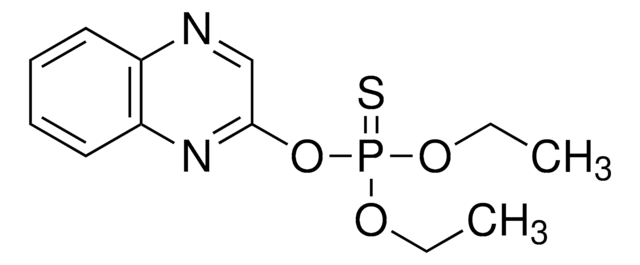32051
Propargite
PESTANAL®, analytical standard, technical mixture
Synonym(s):
2-(4-tert-Butylphenoxy)cyclohexyl 2-propynyl sulfite
About This Item
Recommended Products
grade
analytical standard
Quality Level
product line
PESTANAL®
shelf life
limited shelf life, expiry date on the label
technique(s)
HPLC: suitable
gas chromatography (GC): suitable
application(s)
agriculture
cleaning products
cosmetics
environmental
food and beverages
personal care
format
neat
storage temp.
2-8°C
SMILES string
CC(C)(C)c1ccc(OC2CCCCC2OS(=O)OCC#C)cc1
InChI
1S/C19H26O4S/c1-5-14-21-24(20)23-18-9-7-6-8-17(18)22-16-12-10-15(11-13-16)19(2,3)4/h1,10-13,17-18H,6-9,14H2,2-4H3
InChI key
ZYHMJXZULPZUED-UHFFFAOYSA-N
Looking for similar products? Visit Product Comparison Guide
General description
Application
- Olive oil samples using GC–MS and HPLC–MS methods.
- Tea leaf extract using GC-negative chemical ionization mass spectrometry (GC-NCI-MS) and UHPLC-tandem mass spectrometry (UHPLC-MS/MS).
- Apple leaf extract using HPLC method.
Legal Information
Signal Word
Danger
Hazard Statements
Precautionary Statements
Hazard Classifications
Acute Tox. 2 Inhalation - Aquatic Acute 1 - Aquatic Chronic 1 - Carc. 2 - Eye Dam. 1 - Skin Irrit. 2
Storage Class Code
6.1A - Combustible acute toxic Cat. 1 and 2 / very toxic hazardous materials
WGK
WGK 3
Flash Point(F)
160.5 °F - Pensky-Martens closed cup
Flash Point(C)
71.4 °C - Pensky-Martens closed cup
Personal Protective Equipment
Choose from one of the most recent versions:
Already Own This Product?
Find documentation for the products that you have recently purchased in the Document Library.
Customers Also Viewed
Our team of scientists has experience in all areas of research including Life Science, Material Science, Chemical Synthesis, Chromatography, Analytical and many others.
Contact Technical Service



















